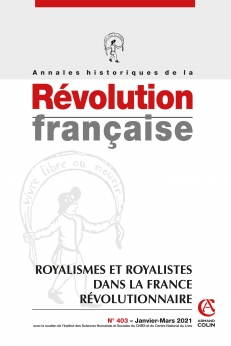
ANNALES HISTORIQUES DE LA RÉVOLUTION FRANÇAISE Nº403 (1/2021)
Pour acheter ce numéro, contactez-nous
Recevez les numéros de l'année en cours et accédez à l'intégralité des articles en ligne.
1796 : Louis de Bonald fait paraître en émigration sa Théorie du Pouvoir politique et religieux depuis Constance. L’ouvrage possède une valeur matricielle pour toute l’oeuvre ultérieure de l’auteur, et son argumentaire, plus largement, fonde théoriquement la Contre-Révolution. Interrogeant l’Histoire afin d’expliquer le phénomène révolutionnaire, il trace en même temps les plans de la restauration qu’il appelle de ses voeux. Le principe monarchique se voit par ailleurs inséré dans une métaphysique globalisante censée ordonner le monde, et désormais le réordonner. Entre envolées utopiques et références à l’actualité immédiate, Bonald mobilise un « passé programmatique » ouvrant un périmètre notionnel inédit en vue d’une régénération sociale durable, scellant une réconciliation de l’humanité avec elle-même. La philosophie politique bonaldienne, trop souvent apparentée sans distinction à celle de Maistre, est ici au contraire appréhendée dans ses spécificités, notamment la réappropriation d’axiomes rousseauistes réinterprétés pour les retourner contre la pensée des Lumières.
In 1796, Louis de Bonald published his Théorie du Pouvoir politique et religieux during his emigration in the city of Constance. This work was the matrix from which author’s later writings originated, and its argument, more broadly, created the theoretical foundation of the Counter-Revolution. By examining history as a means of explaining the phenomenon of revolution, Bonald also outlined the plans for a restoration he hoped for. The monarchical principle became part of a globalizingmetaphysics intended to endowtheworld with order, and then to reorder it, as it were. Between flights of utopian fancy and allusions to contemporary realities, Bonald mobilized a problematic past, opening up an unpublished conceptual dimension aiming at a lasting social regeneration, consolidating a reconciliation of humanity with itself. Bonald’s political philosophy, too often likened indiscriminately to that of de Maistre, is here analyzed in its details, notably the reappropriation of Rousseauist axioms reinterpreted as a weapon against the thought of the Enlightenment.